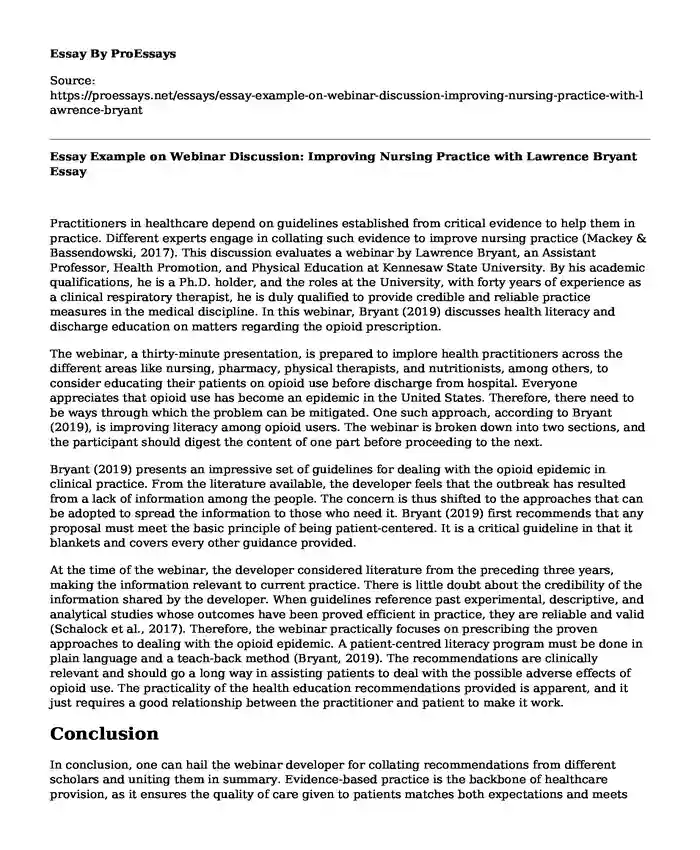Practitioners in healthcare depend on guidelines established from critical evidence to help them in practice. Different experts engage in collating such evidence to improve nursing practice (Mackey & Bassendowski, 2017). This discussion evaluates a webinar by Lawrence Bryant, an Assistant Professor, Health Promotion, and Physical Education at Kennesaw State University. By his academic qualifications, he is a Ph.D. holder, and the roles at the University, with forty years of experience as a clinical respiratory therapist, he is duly qualified to provide credible and reliable practice measures in the medical discipline. In this webinar, Bryant (2019) discusses health literacy and discharge education on matters regarding the opioid prescription.
The webinar, a thirty-minute presentation, is prepared to implore health practitioners across the different areas like nursing, pharmacy, physical therapists, and nutritionists, among others, to consider educating their patients on opioid use before discharge from hospital. Everyone appreciates that opioid use has become an epidemic in the United States. Therefore, there need to be ways through which the problem can be mitigated. One such approach, according to Bryant (2019), is improving literacy among opioid users. The webinar is broken down into two sections, and the participant should digest the content of one part before proceeding to the next.
Bryant (2019) presents an impressive set of guidelines for dealing with the opioid epidemic in clinical practice. From the literature available, the developer feels that the outbreak has resulted from a lack of information among the people. The concern is thus shifted to the approaches that can be adopted to spread the information to those who need it. Bryant (2019) first recommends that any proposal must meet the basic principle of being patient-centered. It is a critical guideline in that it blankets and covers every other guidance provided.
At the time of the webinar, the developer considered literature from the preceding three years, making the information relevant to current practice. There is little doubt about the credibility of the information shared by the developer. When guidelines reference past experimental, descriptive, and analytical studies whose outcomes have been proved efficient in practice, they are reliable and valid (Schalock et al., 2017). Therefore, the webinar practically focuses on prescribing the proven approaches to dealing with the opioid epidemic. A patient-centred literacy program must be done in plain language and a teach-back method (Bryant, 2019). The recommendations are clinically relevant and should go a long way in assisting patients to deal with the possible adverse effects of opioid use. The practicality of the health education recommendations provided is apparent, and it just requires a good relationship between the practitioner and patient to make it work.
Conclusion
In conclusion, one can hail the webinar developer for collating recommendations from different scholars and uniting them in summary. Evidence-based practice is the backbone of healthcare provision, as it ensures the quality of care given to patients matches both expectations and meets the minimum threshold of quality care (Mackey & Bassendowski, 2017). The responsibility shifts to healthcare workers to adopt the evidence and use it practically in their routines. Facilities should also commit resources and train their practitioners on how to adapt the information and use it effectively and efficiently (Mallion & Brooke, 2016). From the recommendations, it is evident that collaboration among the different players is fundamental in adopting the evidence-based guidelines. If such cooperation is not practised, the instructions may not meet their intended purpose of improving care for patients.
References
Bryant, L. (2019). Health literacy and discharge education: I didn’t understand! Part 2. Morrisville, NC, United States; Relias LLC.
Mackey, A., & Bassendowski, S. (2017). The history of evidence-based practice in nursing education and practice. Journal of Professional Nursing, 33(1), 51-55. https://doi.org/10.1016/j.profnurs.2016.05.009
Mallion, J., & Brooke, J. (2016). Community- and hospital-based nurses’ implementation of evidence-based practice: are there any differences? British Journal of Community Nursing, 21(3), 148-154. https://doi.org/10.12968/bjcn.2016.21.3.148
Schalock, R., Gomez, L., Verdugo, M., & Claes, C. (2017). Evidence and evidence-based practices: Are we there yet? Intellectual and Developmental Disabilities, 55(2), 112-119. https://doi.org/10.1352/1934-9556-55.2.112
Cite this page
Essay Example on Webinar Discussion: Improving Nursing Practice with Lawrence Bryant. (2023, Sep 20). Retrieved from https://proessays.net/essays/essay-example-on-webinar-discussion-improving-nursing-practice-with-lawrence-bryant
If you are the original author of this essay and no longer wish to have it published on the ProEssays website, please click below to request its removal:
- A Policy Brief: Maternal Health in Rural Africa
- Applying Evidence-Based Practice in Population Health Improvement Essay
- Essay Example on Robotic Companions: The Future of Human Life?
- Paper Example on IQ Score Variance in Student: Case Study
- Similarities of US & Japanese Families: Divorce, Care for Elderly - Essay Sample
- Nurses: Key to Quality Healthcare and Reducing Healthcare Costs - Essay Sample
- Paper Example on COVID-19: Global Pandemic Impact on Nations & Borders







